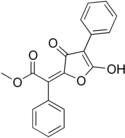| Revision as of 10:03, 12 May 2011 editCheMoBot (talk | contribs)Bots141,565 edits Updating {{chembox}} (no changed fields - added verified revid - updated 'UNII_Ref', 'ChemSpiderID_Ref', 'StdInChI_Ref', 'StdInChIKey_Ref', 'ChEMBL_Ref', 'KEGG_Ref') per Chem/Drugbox validation (← Previous edit | Revision as of 14:25, 26 July 2011 edit undoLouisajb (talk | contribs)Extended confirmed users4,402 edits added chembl idNext edit → | ||
| Line 12: | Line 12: | ||
| | CASNo = 521-52-8 | | CASNo = 521-52-8 | ||
| | PubChem = 3033539 | | PubChem = 3033539 | ||
| | ChEMBL = 463212 | |||
| | SMILES = COC(=O)/C(=C/1\C(=O)C(=C(O1)O)C2=CC=CC=C2)/C3=CC=CC=C3 | | SMILES = COC(=O)/C(=C/1\C(=O)C(=C(O1)O)C2=CC=CC=C2)/C3=CC=CC=C3 | ||
| }} | }} | ||
Revision as of 14:25, 26 July 2011
| |||
| Names | |||
|---|---|---|---|
| IUPAC name Methyl (2E)-2-(5-hydroxy-3-oxo-4-phenylfuran-2-ylidene)-2-phenylacetate | |||
| Identifiers | |||
| CAS Number | |||
| 3D model (JSmol) | |||
| ChEMBL | |||
| ECHA InfoCard | 100.007.560 | ||
| PubChem CID | |||
SMILES
| |||
| Properties | |||
| Chemical formula | C19H14O5 | ||
| Molar mass | 322.316 g·mol | ||
| Except where otherwise noted, data are given for materials in their standard state (at 25 °C , 100 kPa).
| |||
Vulpinic acid is a naturally occurring pulvinic acid derivative found in several lichen species, as well as some non-lichenized fungi. It was first isolated in 1925. It is bright yellow, and relatively toxic.
Occurrence in Lichen
Together with usnic acid and pinastric acid, vulpinic acid is secondary metabolite of the fungi. It is speculated that the substances are used as repellent for some herbivores. The substance showed also some activity against gram-positive bacteria.
References
- Mazza, Franc Paolo (1925). "Constitution and physical properties of vulpinic acid". Rend. Accad. Sci. Napoli. 31: 182–90.
- Lawrey, James D. (1989). "Lichen Secondary Compounds: Evidence for a Correspondence between Antiherbivore and Antimicrobial Function". The Bryologist. 92 (3). The Bryologist, Vol. 92, No. 3: 326–328. doi:10.2307/3243401.
- Bačkor, M.; Hudá, J.; Repčák, M.; Ziegler§, W.; Bačkorová, M. (1998). "The Influence of pH and Lichen Metabolites (Vulpinic Acid and (+) Usnic Acid) on the Growth of the Lichen Photobiont Trebouxia Irregularis". The Lichenologist. 30: 577. doi:10.1017/S0024282992000574.
This article about an organic compound is a stub. You can help Misplaced Pages by expanding it. |
